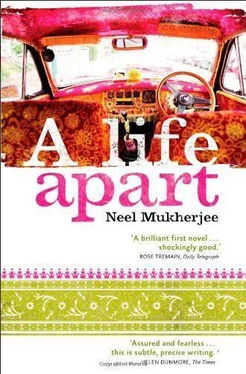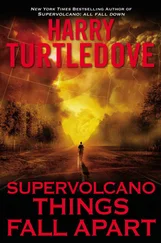Everyone seems to be having money problems. Rachel rigorously limits herself to three pints of lager a week and that too in the college bar because it is heavily subsidized. She tells everyone with disarming frankness, ‘I can’t afford to go out to the pub, you know.’ Ritwik finds the ease with which she talks about financial constraints astonishing: he’d never be able to do it himself. He notices that most of them talk freely about not having very much money, or the need to take up part-time jobs such as waitressing at formal hall dinners, but Peter doesn’t ever join this sort of discussion. Declan tells him, sotto voce, ‘He gets money from his parents’, as soon as Peter goes to the bar to buy a round for everyone. It’s impolite to ask others about the details of their finances, so they don’t ask him about his, nevertheless he feels guilty that they assume about him what they know of Peter.
Ritwik has worked out that Declan’s Catholic — his only visit to the Continent was a bus trip to Lourdes with a bunch of pilgrims — so he tries to avoid mentioning his school past. Declan’s a practising believer in a pervasive way, not only in his world of Sunday morning services and prayers sent up to the BVM, but also in tutorials where he talks of Paradise Lost as Milton’s attempt to make his readers believe in God and the salvation in Christ who pays for the sins of the fallen with His blood. Milton as tub-thumping, silver-tongued evangelist. When he talks about all this, he casts his eyes downwards, a look of utmost reverence settles on his face and his voice goes down an octave or two. He ends by saying that they should all pray after they finish reading the epic. Dr Carter defuses this call to religious communality by agreeing with him but in more sophisticated terms revolving around the seventeenth-century connotations of the word ‘justify’. Sarah says, yes, indeed, they should all pray after closing the book but out of sheer bloody relief.
There is this refreshing down-to-earth quality about Sarah; she seems focused too, but not in a manically driven way. She wants ‘to do good’, as she puts it; to Ritwik, her lack of cynicism, her easy laughter, her feminism are all like a slant of light on the gloom of dusky church marble. She plans to go into education administration because she says Britain’s schools are in a parlous state. It is she who explains to him the difference between grammar, state and comprehensive schools, and the cruel misnomer ‘public’ school. They get on really well and, together with Declan, they form an unusual trio. In another life, he wants to have Sarah’s positive force, be her even, with her glorious head of ringlets, her candour and freckles and unshakeable faith in radical economic redistribution.
Declan talks of girls all the time, not in the way Gavin does, but with more soul and less hormone. He says things such as, ‘Her smile went straight through my heart, you know? I’d like to have her for keeps’ or ‘She lights up my inner world, like’. There is something so touching in his innocence that the kitsch factor can be easily ignored. But Declan believes in the soul, so within that universe all is perfectly acceptable. But all this talk of girls makes Ritwik anxious: he grips his Guinness a touch more strongly, expecting a casual question about his love life any moment. Of course, he’ll lie, but he’ll feel guilty about it, especially because he’ll be lying to these two guileless people. Beside them, his life is a dark labyrinth of shame and secrets.
Sarah always steers the conversation away from love and relationships when Declan gets into his romantic excesses. It is as though she somehow senses this might be a mined area for Ritwik. This evening she gets up and says, ‘Well, I have to be off for work now.’
‘What essay are you doing?’ Ritwik asks.
‘No, it’s not essay work, it’s work work.’
‘You mean work for money?’ Ritwik’s a bit thrown; he didn’t know Sarah had to supplement her grant as well. He feels a surprising, unexpected prick of envy, the envy of the excluded.
‘No, no, not that sort of work. I do voluntary work three nights a week for the south-eastern chapter of the NSPCC. Answering telephones, sending out information, stuffing envelopes, you know, all that kind of stuff. A glorified secretary, really. But for an organization with a heart, not for a cheroot-smoking fat cat.’
‘NSPCC?’ He’s thrown again.
‘The National Society for the Prevention of Cruelty to Children. It’s a charity.’
‘Cruelty to children? What sort of cruelty to children?’ What he really means to ask is ‘Do you have cruelty to children here?’, the emphasis sharply on ‘here’. His dominant idea of cruelty to children revolves around child labour from where he comes — domestic servants, tea-shack boys, sometimes as little as six or seven, working sixteen-hour days for just two frugal meals and a hole to sleep in, beaten up mercilessly if they break a glass or spill tea.
‘Well. .’ she sighs, ‘where do I begin? Mostly domestic abuse, you know, people being violent to children, abusing them, physically or sexually, parental violence to children, battered children. .’
Her words get submerged under the loud pealing of the bells of Magdalen church tower. He has never heard it in this underground cellar bar before, or not consciously, but suddenly it is so loud it seems each ring is coursing through him. Funnily enough, there is no other sound, no bar hubbub, no hum of the other students, no music, just this extreme tolling, as though they are in the suspended moments of a film shot where background noise is eliminated to concentrate on the dialogue between the characters in focus.
‘. . telephone helpline for people to call in to report or seek information and advice, even a childline manned by specially trained counsellors. .’
Her words toll him back again. Sasha’s darts have formed a neat isosceles triangle around the bull’s eye but quite a distance from it and Martin has seized up with laughter at the sight. At the other end of the bar, Dave has just finished pulling a dark pint of Guinness and is now moving the glass in slow careful circles to make a shamrock on the foam with the last few drops from the tap.
Sarah continues, ‘We’re now campaigning for the total ban of smacking in schools. Corporal punishment has long gone, we hope, but even the residue, such as smacking pupils, or children at home, is unacceptable.’
Ritwik moves his left hand from the top of the table and the cold right one from around his pint glass and sits firmly on them: that will stop them from their sudden shaking. His voice is very steady when he asks, ‘Do parents not smack their children here occasionally?’
‘Well, there’s a big debate raging about it at the moment. Most parents seem to be of the view that a firm slap once in a while is no big deal. But we think that constitutes the fundamentals of abuse.’ Her words slip into slightly formal institutionalese; not quite jargon yet, but getting there.
‘You mean disciplining children counts as child abuse? Isn’t that a bit excessive?’
‘No, not at all. A child is a person with rights. Hitting her or him is an act of physical violence. It’s unacceptable. Besides, there are extreme cases of child abuse that is not sexual. You’ll be horrified to hear what some parents do to their children.’
No I won’t what do they do tell me tell me in graphic details tell me what they do .
‘These crimes never get reported because children are either inarticulate, accept this as the norm, are too scared to do anything, or just don’t know if or how anything can be done about it in the first place. It can be any or all of these factors working together.’
Читать дальше












